
Former Minister of Agriculture, Luis Ramón Rodríguez, has sharply criticized the government’s official figures regarding agricultural losses following Tropical Storm Melissa, labeling the reported volume of damages as “exaggerated.” He further cautioned that the declaration of a state of emergency can be used to allow the state-owned insurer, Agrodosa, to avoid paying claims to affected farmers, as reported in Diario Libre.
Rodríguez questioned the “accelerated response” by the government, arguing that natural disaster assessments typically require a technical protocol that takes seven to eight days to complete, not the rapid timeline officials followed.
The former minister alleged that a state of emergency declaration would exempt the Dominican Agricultural Insurance Company (Agrodosa) from its financial obligations.
“If a state of emergency is declared, Agrodosa is exempted from paying damages. So, that could also be the intention,” Luis Ramón Rodríguez stated.
He further denounced that the company has “practically collapsed” and “has not paid any producer for over two years.” Rodríguez claimed a “vicious cycle” persists where the Agricultural Bank withholds insurance premiums without transferring them to the insurer, preventing the fulfillment of payments.
During an interview on the TV program El Despertador, Rodríguez questioned the speed of the government’s damage calculations, stating, “From the outset, what we think is that the response regarding the amount of damage calculated for the agricultural sector was too fast.”
He pointed to significant deficiencies in the assessment process, reminding listeners that the current administration, under President Luis Abinader, had dismissed around 800 Ministry of Agriculture technicians. This, he noted, left nearly 30% of the areas needing inspection without personnel.
“Therefore, five days after the event, you cannot say that you have a completely finished survey, because it doesn’t happen that way. Almost 30% of all technicians in the areas are absent. That means technicians from other locations, from other areas, will have to come to do the assessment.”
The former official maintained that the “real damages” do not justify the estimated amount of RD$1.4 billion to RD$1.8 billion reported by authorities.
He specifically mentioned the northwest region, noting that rainfall was minimal there, and serious damage did not occur along the riverbanks where it typically does. “On the other side, in Puerto Plata it barely rained,” he added.
While acknowledging that some areas, particularly coffee-growing regions, were affected, Rodríguez insisted the overall impact was less severe than the government’s report. “Thank God, there weren’t so many losses,” he concluded.
Barahona, a major coffee-producing area, received around 600 mm of rain in around 10 days due to Melissa and subsequent passing tropical wave and troughs from 22 October to 2 November 2025, as reported in Diario Libre.
The Dominican State is the majority owner of Aseguradora Agropecuaria Dominicana SA (Agrodosa), holding more than 80% of the shares in the mixed-capital corporation. The remaining shares are distributed among producers, insurance companies, and public institutions related to the agricultural sector.
Protecting against climate risks
Agricultural insurance acts as a critical risk protection mechanism, guaranteeing that local producers can financially safeguard their production investments following adverse climatic events. This coverage is vital for mitigating losses caused by hurricanes, droughts, storms, floods, and other natural disasters.
To manage catastrophic exposure, Agrodosa transfers risk internationally by ceding policies to major global reinsurers. The company currently partners with Munich Re, MS Amlin AG, and Hannover Re.
The Dominican Government actively supports the sector through significant subsidies. The Ministry of Agriculture, via the General Agricultural Risks Agency (DIGERA), contributes up to 50% of the premium value for insured producers, making essential coverage more accessible to the nation’s farmers. To be ensured, farmers need to have the farm’s land title.
Read more in Spanish:
Noticias SIN
Panorama
Agrodosa
Diario Libre
5 November 2025

